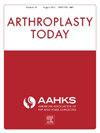Routine Postoperative Hemoglobin and Hematocrit Tests Are Unnecessary Following Primary Total Hip and Knee Arthroplasty
IF 2.1
Q3 ORTHOPEDICS
引用次数: 0
Abstract
Background
Acute blood loss and transfusion are recognized risks factors of total hip (THA) and total knee arthroplasty (TKA). This study aimed to investigate the clinical value of immediate postoperative hemoglobin and hematocrit (H&H) tests following primary elective THA and TKA.
Methods
This retrospective observational study was undertaken at a single academic hospital. Medical records were reviewed for a consecutive series of patients undergoing primary elective THA and TKA over a 12-month period. Patient demographic data; the use of preoperative anticoagulants; preoperative and postoperative blood test results; and the incidence of postoperative allogenic blood transfusion (ABT) were collected. The primary outcome measure was the incidence of postoperative ABT prescribed in response to the immediate postoperative H&H result.
Results
Overall, 367 eligible patients were included, with 167 THA (46%) and 200 TKA (54%) cases. Only 3 patients (0.8%) received a postoperative ABT; none on the day of surgery or on postoperative day 1. Immediate postoperative H&H tests were drawn in 246 patients (67%), but it did not influence clinical decision-making with regards to transfusion. No significant differences in ABT were observed in relation to patient age, sex, body mass index, operation (THA or TKA), or the use of preoperative anticoagulation medication. The incidence of ABT was significantly higher in patients with a combined preoperative hemoglobin <12.5 g/dL and hematocrit <40.0% (P = .003).
Conclusions
The incidence of postoperative blood transfusion following primary elective THA and TKA was low at 0.8%. Postoperative H&H tests were drawn in most patients but did not influence clinical management. Immediate postoperative hematological monitoring is unnecessary for most low-risk patients following uncomplicated primary elective THA and TKA.
初次全髋关节和膝关节置换术后无需进行常规的术后血红蛋白和血细胞比容检测
背景急性失血和输血是公认的全髋关节(THA)和全膝关节置换术(TKA)的危险因素。本研究旨在探讨初诊择期全髋关节置换术(THA)和全膝关节置换术(TKA)术后立即检测血红蛋白和血细胞比容(H&H)的临床价值。研究人员查阅了一系列在 12 个月内接受初次择期 THA 和 TKA 手术的患者的病历。研究收集了患者的人口统计学数据、术前抗凝药物的使用情况、术前和术后血液检测结果以及术后异体输血(ABT)的发生率。主要结果指标是术后立即使用H&H结果所导致的术后ABT发生率。结果总共纳入了367例符合条件的患者,其中167例THA(46%),200例TKA(54%)。仅有 3 例患者(0.8%)在术后接受了 ABT,其中没有一例是在手术当天或术后第 1 天接受的。有 246 名患者(67%)在术后立即进行了 H&H 检测,但这并不影响输血方面的临床决策。ABT与患者的年龄、性别、体重指数、手术(THA或TKA)或术前抗凝药物的使用无明显差异。术前合并血红蛋白为 12.5 g/dL 和血细胞比容为 40.0% 的患者 ABT 发生率明显更高(P = .003)。结论初选 THA 和 TKA 术后输血发生率较低,仅为 0.8%。大多数患者术后都进行了 H&H 检测,但这并不影响临床治疗。对于大多数无并发症的初诊择期 THA 和 TKA 低风险患者来说,术后无需立即进行血液监测。
本文章由计算机程序翻译,如有差异,请以英文原文为准。
求助全文
约1分钟内获得全文
求助全文
来源期刊

Arthroplasty Today
Medicine-Surgery
CiteScore
2.90
自引率
0.00%
发文量
258
审稿时长
40 weeks
期刊介绍:
Arthroplasty Today is a companion journal to the Journal of Arthroplasty. The journal Arthroplasty Today brings together the clinical and scientific foundations for joint replacement of the hip and knee in an open-access, online format. Arthroplasty Today solicits manuscripts of the highest quality from all areas of scientific endeavor that relate to joint replacement or the treatment of its complications, including those dealing with patient outcomes, economic and policy issues, prosthetic design, biomechanics, biomaterials, and biologic response to arthroplasty. The journal focuses on case reports. It is the purpose of Arthroplasty Today to present material to practicing orthopaedic surgeons that will keep them abreast of developments in the field, prove useful in the care of patients, and aid in understanding the scientific foundation of this subspecialty area of joint replacement. The international members of the Editorial Board provide a worldwide perspective for the journal''s area of interest. Their participation ensures that each issue of Arthroplasty Today provides the reader with timely, peer-reviewed articles of the highest quality.
 求助内容:
求助内容: 应助结果提醒方式:
应助结果提醒方式:


